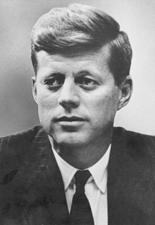John F. Kennedy: Difference between revisions
imported>Yi Zhe Wu (→Sources: source) |
imported>Yi Zhe Wu (→Presidency: fill section) |
||
| Line 18: | Line 18: | ||
==Presidency== | ==Presidency== | ||
Although Kennedy's presidency only lasted for two years, his policies, both domestic and foreign, had profound influence in American history. | |||
==Domestic policy== | |||
During his administration, Kennedy proposed the [[Medicare]] but did not succeed (Medicare was enacted, however, under later presidents). He also called for [[civil rights]] legislations. In 1961 he sent federal marshals to protect [[Freedom Riders]] in [[Alabama]] | |||
==Foreign policy== | |||
Kennedy's presidency was marked by extensive international involvement of the United States, including the establishment of [[Alliance for Progress]] and the [[Peace Corps]]. He maintained a strong stance against [[Communist]] government in [[Cuba]]. He ordered the invasion of Cuba by a group of Cuban exiles to overthrow the regime of [[Fidel Castro]], but the invasion was unsuccessful. Subsequently the [[Soviet Union]] secretly installed missiles, causing the [[Cuban Missile Crisis]], which could have escalated into a [[nuclear war]]. Kennedy responded by a quarantine on Cuba, forcing Khrushchev to remove the missiles. | |||
He played an important role in U.S. involvement in [[Vietnam]], continuing Eisenhower's policy to aid South Vietnam to counteract Communist force of North Vietnam and the Vietcong. His successor, [[Lyndon B. Johnson]], greatly escalated the involvement in the conflict which is referred today as the [[Vietnam War]]. | |||
===Supreme Court nominations=== | ===Supreme Court nominations=== | ||
Revision as of 21:16, 14 May 2007
John Fitzgerald Kennedy (1917-1963) was an American politician and one of the prominent member of the Kennedy family. He served as the 35 th President of the United States from 1961 to 1963. Prior to his presidency, he served as a Representative from 1947 to 1953 and a U.S. Senator from 1953 to 1960, representing the state of Massachusetts. He remains a symbolic figure of the 1960s and his presidency was a milestone in the transition of the Democratic Party. Kennedy was assassinated in 1963 in Texas, supposedly by Lee Harvey Oswald, and the cause of his assassination is still unknown.
Early life
Kennedy was born in 1917 in Brookline, Massachusetts. He graduated from Harvard University in 1940. During the World War II he joined the United States Navy and participated in the combat. He was severely injured in the battle, but survived. In 1946, he was elected to the United States Congress.
Political career
He served as a congressman from 1947 to 1953 and was elected to the Senate in 1952. In 1956, he attempted to gain the Democratic nomination for the Vice Presidency, and was favored by the presidential candidate Adlai Stevenson. However, Estes Kefauver was chosen instead. He served in the Senate until 1960, when he resigned to assume the presidency.
Election of 1960
In 1960, Kennedy was nominated by the Democratic Party for the presidential election. His opponent from the Republican Party was Richard Nixon, the Vice President at that time. The election was marked by the use of televised debate of the first time, between Kennedy and Nixon. During the debate, the young, calm Kennedy gained advantage against Nixon, who appeared awkward on the television.
Kennedy won the election narrowly, with 49.7% of the popular vote and 303 electoral votes. Nixon obtained 49.5% of the votes and 219 electoral votes. Several southern electors cast their electoral ballot to Harry F. Byrd, a segregationist Senator from Virginia.
Presidency
Although Kennedy's presidency only lasted for two years, his policies, both domestic and foreign, had profound influence in American history.
Domestic policy
During his administration, Kennedy proposed the Medicare but did not succeed (Medicare was enacted, however, under later presidents). He also called for civil rights legislations. In 1961 he sent federal marshals to protect Freedom Riders in Alabama
Foreign policy
Kennedy's presidency was marked by extensive international involvement of the United States, including the establishment of Alliance for Progress and the Peace Corps. He maintained a strong stance against Communist government in Cuba. He ordered the invasion of Cuba by a group of Cuban exiles to overthrow the regime of Fidel Castro, but the invasion was unsuccessful. Subsequently the Soviet Union secretly installed missiles, causing the Cuban Missile Crisis, which could have escalated into a nuclear war. Kennedy responded by a quarantine on Cuba, forcing Khrushchev to remove the missiles.
He played an important role in U.S. involvement in Vietnam, continuing Eisenhower's policy to aid South Vietnam to counteract Communist force of North Vietnam and the Vietcong. His successor, Lyndon B. Johnson, greatly escalated the involvement in the conflict which is referred today as the Vietnam War.
Supreme Court nominations
During his presidency, he nominated two justices to the Supreme Court. They are Byron White, best known for his dissent in Roe v. Wade, and Arthur J. Goldberg, who later left the court to serve as the U.S. Representative to the United Nations.
